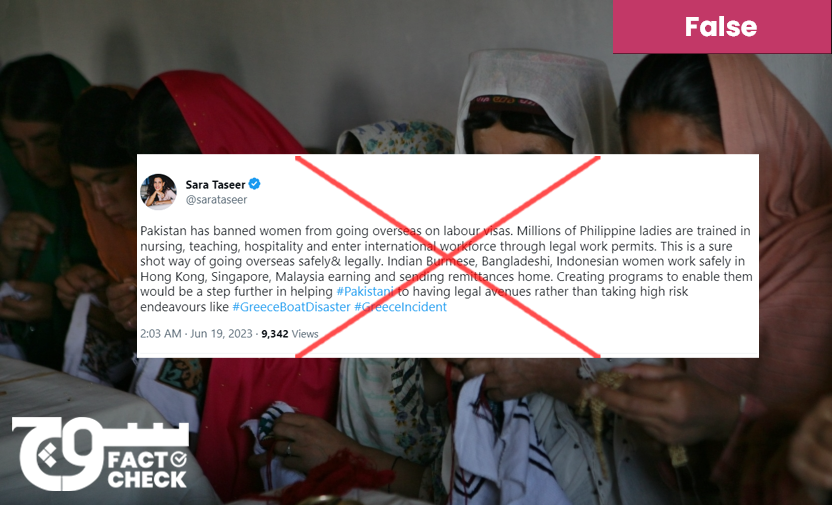
Claim: Pakistan has banned women from going overseas on labour visas, preventing women from working in nursing, teaching, and hospitality through legal work permits.
Fact: Pakistan has not banned women from going overseas on labour visas. According to the Pakistan Bureau of Emigration and Overseas Employment (BE&OE), between 1971 and 2019, 40,807 Pakistani registered female emigrants went overseas to work. The largest category of these women (14 per cent) migrated as domestic workers/housemaids.
On 19 June 2023, jewellery designer Sara Taseer, the daughter of former governor Punjab Salman Taseer, claimed that Pakistan banned women from going overseas on labour visas. She claimed that this policy prevents women from working in nursing, teaching, and hospitality through legal work permits. Taseer further claimed, “This is a law in Pakistan for 35 years. Women are not allowed to exit on a labour visa. It was put in place to prevent human trafficking. But the world has changed since then.”
Fact or Fiction?
Soch Fact Check investigated the claim that Pakistan banned women from going overseas on labour visas by consulting official data from the Pakistan Bureau of Emigration and Overseas Employment (BE&OE), which was published in a report by the International Labour Organisation (ILO) titled “Female Labour Migration from Pakistan: A situation analysis”. The report shows that between 1971 and July 2019, a total of 40,807 Pakistani registered female emigrants went overseas to work. The largest category of these women (14 per cent) migrated as domestic workers/housemaids, while over 15 per cent were doctors and nurses (8.4 and 4.4 per cent, respectively); 15 per cent proceeded as helpers and general workers; 11 per cent as managers and around nine per cent as clerical staff.
These figures contradict Taseer’s claim that Pakistan has banned women from going overseas on labour visas, preventing them from working in nursing, teaching, and hospitality through legal work permits.
The report also states that there is no specific emigration policy for any category of female workers. While there is no official government policy that explicitly prohibits women from going abroad for employment as domestic workers or “housemaids,” the Pakistan Government has set an age limit of 35 years for women working in the domestic workers category in its code of conduct for Overseas Employment Promoters (OEPs). However, this age limit can be relaxed by up to five years in special cases. It appears that Taseer may have misunderstood this age limit as a complete ban. The reason behind imposing this age limit is to address cases of exploitation of women by their employers, particularly in the Gulf region.
In addition to the age limit of 35 years for the housemaid category, some of the women interviewed for the ILO report revealed that aspiring women migrant workers were required to obtain consent from a male guardian (father, brother, etc.) in order to complete the employment process. However, if a male guardian was unavailable, a female elder such as a mother was allowed to provide consent. This requirement of “permission” from a blood relation highlights the inherent gender bias in Pakistani society. It is important to note that neither of these conditions should be categorised as a “ban.”
Moreover, Taseer’s use of the phrase “Pakistan has banned women from going overseas on labour visas” implies that the policy has been recently passed, but actually no such policy mentioning female emigration in specific has been passed in the past decade. Some restrictions such as age limits which Taseer may be referring to have been around for decades, and they do not constitute a ban since many women have gone abroad to work in these professions on legal work permits.
Virality
This tweet was viewed more than 9,342 times and received over 300 interactions.
Conclusion: The claim that Pakistan has banned women from going overseas on labour visas is false. There is no ban on any profession or category of workers, including women, from going overseas on labour visas. The data shows that thousands of Pakistani women have gone abroad for work in various professions, including nursing, teaching, and hospitality, through legal work permits.
To appeal our fact-check, please send an email to appeals@sochfactcheck.com
